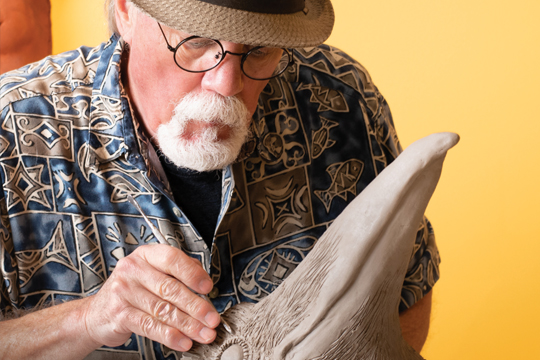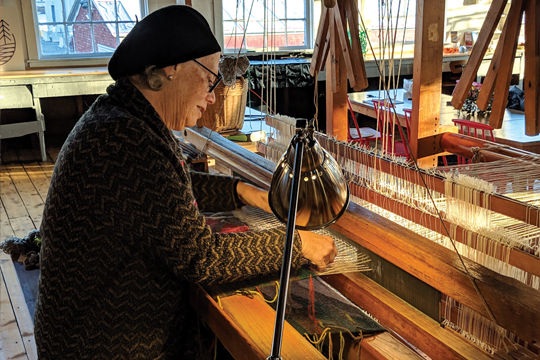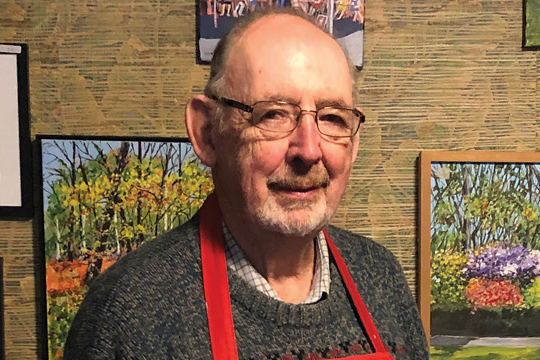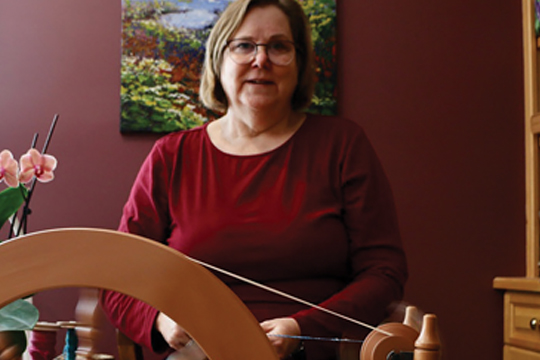
Sage talked to five retirees who have found artistic ways to access their inner creators.
Have you been ignoring your artistic side for too many years? Longing to turn your hand to jewelry-making or ceramics? Sage talked to five creative folks across Canada who ramped up their artistic pursuits when they retired and haven’t looked back.
The Whitehorse sculptor
Donald Watt
Former weather observer and supervisor, Environment Canada
Donald Watt has an advantage as a professional sculptor. “I think three dimensionally,” says the long-time Yukon resident. As a member of Environment Canada’s weather service, from which he retired in the mid-1990s, “I could visualize a stormfront moving in and with a bit of information from the forecaster, I could figure out if it would get worse or better.”
Sculpting mostly in clay and occasionally bronze, he’s also competed internationally on award-winning snow-carving teams, designed and built theatre sets — he says “it’s just a big sculpture that people can walk through” — and done assorted other things, including a fine arts degree at the University of Manitoba where he discovered the joy of sculpting.
“When you paint or draw, you just see one side. With sculpture, you can see all the way around. You get to express it so it has volume and can be appreciated from any side.”
His work comes from stories — imagining in physical form a word or narrative he’s encountered. He loves northern mythology, particularly the shape-shifting raven, which he’s sculpted with a bird’s head and various human body types to appeal to a wide audience.
Watt’s advice to aspiring sculptors: “There’s lots of help out there, lots of workshops... There’s something really nice about the tactile feel of a material in your hands and you’re creating something out of nothing. It’s fun.”
The Ottawa poet and fiction writer
Deborah-Anne Tunney
Former communications officer, National Research Council (NRC)

Deborah-Anne Tunney says if she didn’t write, she thinks she’d be living rudderless.
“It never is what you want it to be,” says Deborah-Anne Tunney, but the nagging feeling that her choice of word or phrase could have been better — writers can be obsessive — hasn’t exactly slowed her down. Since retiring from the NRC in 2006, she’s published a book of short stories called The View from the Lane, a novel titled Winter Willow and A Different Wolf, an award-winning collection of poetry. She’s now working on new material, including a series of poems on backyards and another collection of short stories.
For Tunney, who joined Federal Retirees in 2019, writing has always been “the thing I wanted to do, the thing I needed to do... I’ve been like this since I was very young, probably about 11 when I started writing poetry. If I didn’t write, I think I’d be living rudderless.” She tries to write every day, including keeping up a diary, and belongs to a poets’ circle — Ruby Tuesdays — that offers support and helps her keep on track.
She wrote while at the National Research Council and also completed two degrees and a partial PhD in English literature, but promised herself she’d take up writing full-time once retired. Tunney is clearly a woman who keeps her promises.
Her advice to aspiring writers: “If you’re serious, you need to study, you need to read and read and read, and you need to know what kind of writing you’re going to do. It needs to become probably more than the number of hours you worked at your job.”
The Lunenburg, N.S., weaver
Megan Williams
Former cultural program officer, Canadian Heritage

One rug will take Megan Williams a couple of months to complete.
Visualize walking toward your younger self. That’s the advice Megan Williams once heard from a First Nations woman who was speaking directly to aging women, and it hit home because that’s what Williams did by reconnecting with weaving.
As a young woman, Williams did a weaving apprenticeship in Denmark and worked on tapestries on Baffin Island, but she largely set it all aside when she entered the civil service. She retired in the late 1990s and eventually returned to weaving and now, when she’s not working as the district director for the Atlantic region on Federal Retirees’ board of directors, she works as an arts and crafts professional making rugs and tapestries on her large loom in an idyllic Lunenburg, N.S., studio.
Unlike the parameters dictated by an administrative job, “Weaving is all in your own hands. You decide everything about what you’re creating,” she says.
Williams also relishes the way daily concerns disappear in the studio as well as the way weaving demands discipline. “To make work that is properly made and long-lasting and beautiful... takes a long time; it’s not like sitting for an afternoon and dashing off a painting. One rug will take me a couple of months.”
Williams’ advice to aspiring weavers: “Assess the amount of patience you have. If you have a lot, you can do it... (To get started) go online and look around: there’s a weaver’s guild or craft workshops in most communities.”
The Victoria, B.C., painter
Victor Lotto
Former Canadian ambassador to Venezuela and Dominican Republic

Victor Lotto, a retired Canadian ambassador, now spends three mornings a week painting.
A little watercolour kit helped Victor Lotto hone his painting skills while promoting and supporting Canadian trade and business abroad. It also rejuvenated him. “It’s the greatest form of escape and relaxation when you’ve been doing busy and demanding things, which I guess I did in my career,” he says.
Retired from the government since 1994, Lotto, who first joined Federal Retirees in 1996, now paints three mornings a week, working in watercolour outside and in acrylic in his studio. His online
gallery at victorlotto.ca shows a love of varied subjects, from convivial outdoor cafés in France to waterside paintings on Canada’s West Coast. They also suggest he’s achieved his artistic ambition: “To
evoke the feeling I have at the time.”
Over the years, Lotto has exhibited his paintings at home and abroad and sold a number of them. He has taken advantage of workshops to keep up with changing materials and techniques and he’s also taught them, which offers its own satisfaction of seeing others, “especially older people,” develop their skills.
Lotto has practical advice for retirees who share his painting aprirations. “With a good instructor and fellow painters, you’re going to have this fabulous sense of satisfaction. There’s that moment of creativity and spark that makes you forget you’re now getting to a certain age.”
The Saskatoon spinner and weaver
Diney Bekkaoui
Former research assistant, Agriculture and Agri-Food Canada

Diney Bekkaoui spins her own yarn.
Originally an avid knitter, Diney Bekkaoui began spinning her own yarn 10 years ago, thinking it would save money. It didn’t. Then she discovered she couldn’t knit fast enough to keep up with the yarn she was spinning, so five years ago she added weaving to her skillset. Turns out that as a youngster, she’d churned out pot holders on a child’s loop loom, making her artistic journey a bit of a circle, not unlike her beloved spinning wheel.
Handling the raw wool makes spinning a tactile experience, she says. Weaving, with its focus on operating the loom itself, is more visual. “It’s really pretty and fun to watch the patterns emerge,” Bekkaoui says.
Retired since 2021, she spins and weaves frequently, but not every day. She makes scarves, shawls, tea towels and napkins, selling or giving them as gifts and donating the napkins to a school fundraising program.
How does she view her weaving? “I think what I’m doing now is a craft, but I’d like to elevate it to an art.”
Bekkaoui’s advice to aspiring weavers: “Find a guild. It’s a really good mentoring [opportunity] — they’ve been welcoming to me. There are all kinds of resources.”

